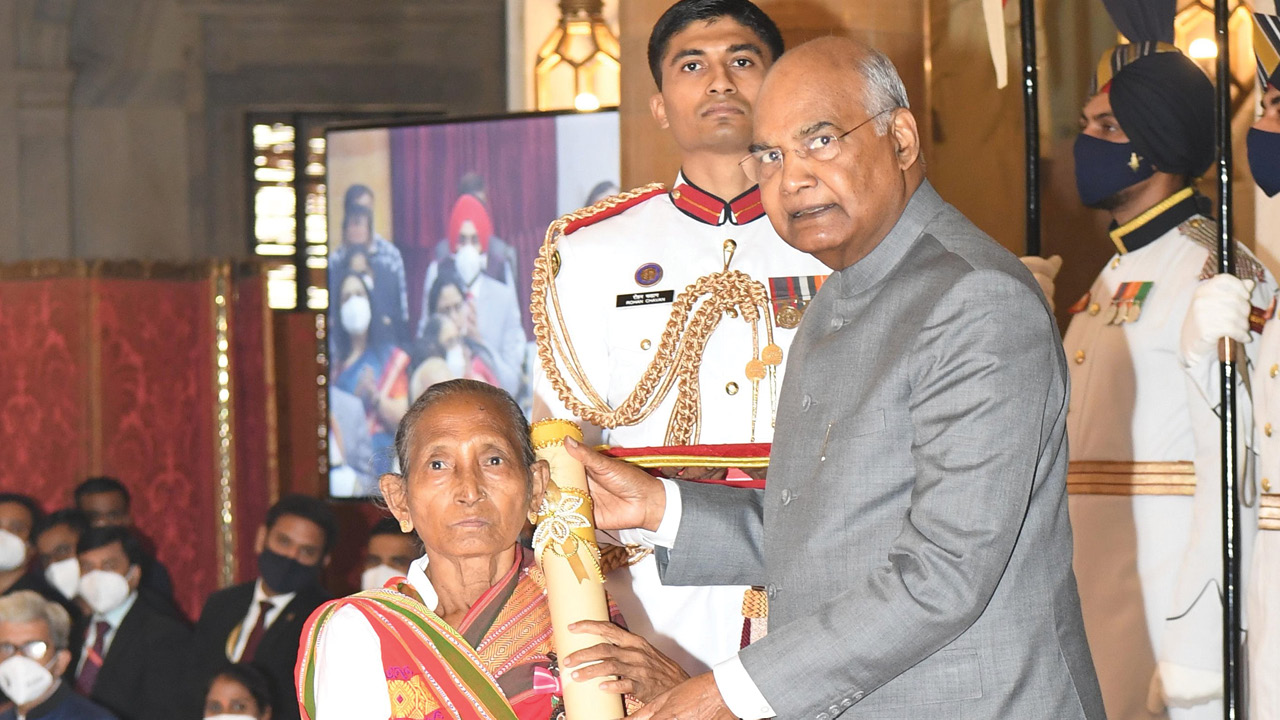Birubala Rabha
Birubala Rabha
Born: 1954-2024
Vill.- Rambudara, PO – Lela
Goalpara, Assam
Padma Shri: 2021

About
Birubala Rabha, an indomitable activist from Assam, India, was honoured with the Padma Shri in 2021 for her relentless crusade against the practice of witch-hunting. This accolade, India’s fourth-highest civilian award, recognised her significant contributions to social work and her unwavering commitment to eradicating superstitious practices that have plagued her community for decades.
Education
Born in 1954 in the village of Thakurvila, near the Meghalaya border in Assam’s Goalpara district, Birubala’s educational journey was abruptly halted at the tender age of six. The untimely death of her father compelled her to leave school and shoulder household responsibilities alongside her mother. This early departure from formal education did not deter her; instead, it instilled in her a profound understanding of the challenges faced by marginalised communities, particularly women accused of witchcraft.
Hardships Faced
At fifteen, Birubala married a farmer, with whom she had three children. In 1985, her eldest son, Dharmeswar, who had been battling mental illness, contracted typhoid. Seeking help, the family consulted a local quack who attributed his condition to supernatural causes, claiming possession by a fairy and predicting his imminent death. Contrary to this grim prognosis, Dharmeswar recovered, leading Birubala to question and ultimately reject such superstitious beliefs. This personal ordeal became the catalyst for her lifelong mission to combat the deeply entrenched practice of witch-hunting in Assam.
Contributions that Brought About the Change
Her strategic and compassionate interventions mark Birubala Rabha’s journey from a concerned mother to a pioneering activist:
- Grassroots Mobilisation: Recognising the power of collective action, Birubala established the Thakurvila Mahila Samity, a women’s association dedicated to raising awareness about social maladies, including witch-hunting. This initiative empowered local women to challenge age-old superstitions and advocate for their rights.
- Formation of Mission Birubala: In 2011, she founded Mission Birubala, a non-profit organisation comprising social activists, survivors, and legal experts. The organisation focuses on educating communities about the dangers of witch-hunting, providing support to victims, and facilitating their reintegration into society. Through workshops, awareness camps, and school programs, Mission Birubala has been instrumental in changing perceptions and reducing incidents of witch-hunting in Assam.
- Legislative Advocacy: Birubala’s relentless advocacy was pivotal in enacting The Assam Witch Hunting (Prohibition, Prevention, and Protection) Act in 2015. This legislation criminalises the identification and branding of individuals as witches, prescribing stringent penalties, including up to seven years of imprisonment and substantial fines. Her collaboration with law enforcement and policymakers ensured that the law addressed the root causes of witch-hunting and provided mechanisms for victim protection and offender punishment.
- Rescue and Rehabilitation: Over the last decade of her life, Birubala personally rescued more than thirty-five women accused of witchcraft. She provided them shelter, legal assistance, and counseling, facilitating their return to normalcy. Her empathetic approach saved lives and restored dignity to countless victims ostracised by their communities.
- Collaboration with Law Enforcement: Understanding the importance of a multifaceted approach, Birubala worked closely with Assam Police’s Project Prahari, initiated in 2001 to combat witch-hunting. Her insights and grassroots experience enriched the project’s strategies, leading to more effective community policing and awareness campaigns.
Before and After
Before Birubala’s interventions, Assam witnessed rampant cases of witch-hunting, with numerous individuals, predominantly women, subjected to violence, social ostracism, and even death based on unfounded accusations. Communities were ensnared in a web of fear and superstition, with quacks and traditional healers exploiting these beliefs for personal gain.
The landscape began to transform with Birubala’s grassroots activism. Her awareness campaigns illuminated the irrationality of witch-hunting, leading to a gradual decline in such incidents. The enactment of the 2015 legislation provided a legal framework to punish perpetrators and protect victims, serving as a deterrent against future occurrences. Communities that once shunned accused individuals began questioning age-old superstitions, fostering a culture of rationality and empathy.
Achievements and Accolades
Birubala Rabha’s unwavering dedication earned her numerous accolades:
- Nobel Peace Prize Nomination (2005): The Northeast Network, a women’s rights organisation in Assam, nominated her for the Nobel Peace Prize, recognising her courageous efforts to combat witch-hunting.
- Honourary Doctorate (2015): Gauhati University conferred an honourary doctorate, acknowledging her significant contributions to social reform and women’s empowerment.
- Padma Shri Award (2021): The Government of India honoured her with the Padma Shri for her extensive social work, particularly her campaign against witch-hunting.
- Women’s World Summit Foundation Prize (2018): She was recognised for her exceptional courage and commitment to improving the lives of women and children in rural communities.

